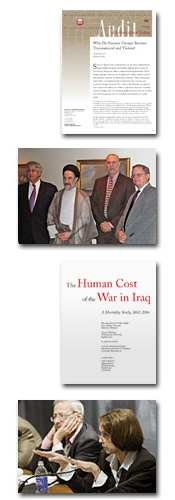
Persian Gulf Initiative
The Persian Gulf Initiative seeks to explore the shifting dynamics in this critical region in the vernacular of the region-providing a platform for understanding emerging issues and their policy implications from the perspective of the region itself, and how they relate to the United States and to the broader international community. In effect, this is an effort to shift the focus from U.S.-centric to region-centric, and to include issues that evolve from and affect the domestic and regional political and security environment.
The Initiative is organized around workshops at which leading scholars and practitioners from the region, Europe, and the United States examine issues of common concern and interest. From these workshops, occasional papers, reports, published articles, and public forums, we provide both the context and the means to create new knowledge useful to scholars, policy practitioners, journalists, and NGOs. Our goal is to constructively contribute to public debate in the United States, the Gulf and beyond, on this region of central geography, venerable history, great cultures, and contemporary significance.
In its initial offerings in 2005, the Initiative hosted a series of workshops on "The Crisis in Governance" in Saudi Arabia, Iraq and Iran. In 2006, two workshops were convened, one in April on transnational violence and the second in November on the regional implications of the war in Iraq. Future workshops are planned on topics relevant to India and the Gulf, energy security, Iranian civil society, and the governance challenge.
The Iraq mortality study was commissioned from this program and published in The Lancet, stirring important new debates on the human cost of the war. Several public forums have been mounted in New York, Washington, D.C., and the MIT campus. Among the notable events was a talk by former Iranian president Mohammed Khatemi, who visited in September 2006, addressing faculty, students, alumni, and guests.
The major project of the past several years has been the “critical oral history” exploration of the U.S.-Iran relationship. Three major workshops have been held involving a dozen policy makers, and has covered the U.S. role in the Iran-Iraq War and the period of reform. The project produced a book on the war in 2012, based on materials gathered in the workshops and interviews, entitled, Becoming Enemies: U.S.-Iran Relations and the Iran-Iraq War, 1979-1988 (Rowman & Littlefield). The period of reform and the nuclear issue will be subjects of another workshop in 2012. The project works with MIT’s innovative online platform, HyperStudio, to archive and present the research, which will be open to the public later in 2012.
The Initiative has also pursued work on the Iraq War through its Human Cost of War web site, and a new book by John Tirman, The Deaths of Others: The Fate of Civilians in America’s Wars (Oxford University Press, 2011). This work also resulted in articles for the New York Times, Washington Post, Boston Globe, and Boston Review, among others, and led to appearances at Oxford University, Harvard University, University of California, Berkeley, London School of Economics, PBS, NPR, and other venues.


